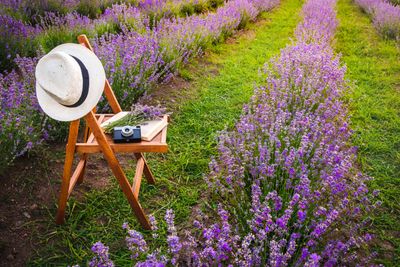How to Create a Lavender Garden
Lavender is a low maintenance perennial herb originating in the Mediterranean. Grown for its fragrant flowers, lavender blooms can be used in soap making, potpourri, aromatherapy, and much more. Lavender is often planted along walkways and patios, added to herb gardens, or used in formal knot gardens. With a few simple steps, you can create your own garden of lavender. Begin by choosing a good location for your lavender garden. Plants from the various lavender species require a sunny location with good drainage. Lavender prefers a neutral pH of 7 and does well in sandy or gritty soil. In humid or rainy environments, lavender may thrive better when grown in raised beds. Once you’ve chosen a location for your new garden of lavender, consider which varieties you wish to grow. With over 200 types of lavender available, gardeners can choose between various sizes, bloom times, hardiness, and flower color. With these choices in mind, the next step is planning a lavender garden design. Elements of color, composition, and balance can be combined when creating a unique lavender garden design. For mixed flower beds, try contrasting lavender’s spiky, purple blooms with bright orange California poppies or yellow black-eyed Susan. Create a subtle color palette by growing lavender in front of a light-colored wall or white fence overgrown with pastel pink climbing roses. Add a bench, rock features, or bird bath for eye appeal. For centuries, lavender has also been used as a natural insect repellent. Planting rows of lavender near outdoor living spaces combines beauty with practicality. Lining walkways with lavender softens their edges and creates a more inviting atmosphere. Or try your hand at an all-lavender garden planted in an intriguing geometric pattern.
Growing Healthy Lavender Garden Plants
When plotting an all-lavender garden, consider the mature size of each variety. Leaving adequate space between plants not only makes it easier to weed and harvest lavender, but also creates a healthier environment for the herb. Fungus and root rot are common problems when growing a lavender garden. Plants that are affected are best removed, but prevention is the key. These issues are often caused by overwatering, poor drainage, excessive humidity, and inadequate air circulation around the base of the plant. In lieu of moisture-retaining mulch, opt for sand or pea gravel as a groundcover. These will not only deter weed growth, but also improve surface drainage and decrease ground-level humidity. Once an all-lavender garden is established, it requires minimal care. Annual pruning and regular weeding will keep the garden growing and producing beautiful and fragrant lavender blossoms for years to come.
